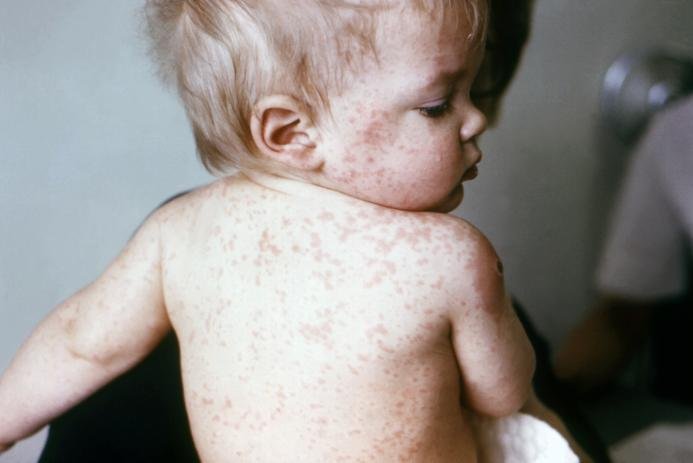Researchers have developed a coin-sized device to detect the measles virus in human saliva. Photo by the Centers for Disease Control and Prevention/Wikimedia Commons
July 7 (UPI) -- A coin-sized device may help detect the measles virus in human saliva, possibly allowing early diagnosis to help control the spread of this extremely contagious disease.
That's the gist of new research published Thursday in Advanced Functional Materials.
To put their work into context, the researchers noted that measles is one of the most infectious airborne viruses worldwide: six times more infectious than the SARS-CoV-2 Alpha variant and similar to the SARS-CoV-2 Omicron variant.
Although measles was declared eliminated in the United States in 2000, almost 1,300 cases were reported in 31 states in the country in 2019 -- the greatest number since 1992, according to the Centers for Disease Control and Prevention.
CDC says roughly nine out of every 10 people who are not vaccinated will become infected after exposure to the measles virus.
The researchers described their newly created device as "lab-on-a-chip" that is about the size of a U.S. quarter, tested and validated by loading the measles virus into healthy human saliva.
"The sensor device is a surface-acoustic-wave (SAW) resonator -- a sort of 'drum' with a specific sound," Marco Cecchini, the study's senior author and senior researcher at the Italian National Research Council's Nanoscience Institute, told UPI in an email.
"When the virus attaches to the sensor surface, it modifies the SAW propagation velocity, thus modifying the 'sound' of the drum," he said.
Cecchini explained that scientists are able to detect this change by a simple electrical measurement and to correlate it to the concentration of the virus in the sample.
He stressed that the device is envisioned to work hand-in-hand with measles vaccination efforts as an adjunct.
"Measles vaccination is a fundamental tool to avoid widespread diffusion of this very dangerous virus," he said.
"Nonetheless, fast, cheap diagnostics devices still remain fundamental for monitoring outbreaks of the disease."
According to Cecchini, the single-use device isn't actually inserted into the mouth. Instead, the sample of saliva is collected from the patient and injected into the device. "The detection can be pretty fast -- 15 to 30 minutes or even less," he said.
"We still have not done a clinical trial, but already detected the virus in whole human saliva in our lab," he added.
Researchers said the measles-detecting device may enable "early point-of-care diagnostic applications."
As Cecchini envisions it, this could lead to widespread of the device by physicians to detect measles in their patients. Or, he said, "It could be also used by the patient himself as we do with the COVID fast antigen tests."
He also anticipates potentially broader use of the device, beyond measles detection.
"The sensing technology, which is basically a mass sensor, can be tailored for other applications by changing the surface chemistry of the microresonators [the active elements of the chip]," he said.
"For example," Cecchini said, "other viruses can be envisioned -- like the SARS-COV-2, just to name the most 'famous' at moment."
"Moreover, we already had a good performance with bacteria (e.g. legionella in water), or protein disease biomarkers in blood," Cecchini noted. "We also have an active project in a different field: detection of polyphenols in wine and olive oil."
Cecchini, when asked whether detection would work even before a person displays visible signs of the illness, said, "This must be still tested."
As for the timeline, Cecchini said the device's practical application may take a while.
"This is a proof-of-concept study," he said. "For commercialization, we will need to find funding for industrial development and clinical trial testing.
"We already have set up a startup company [Intelligent Acoustics Systems in Italy], which is the owner of the patent related to the sensing technology."
Cecchini is listed as the company's chief technical officer and co-founder in the study's press release.















